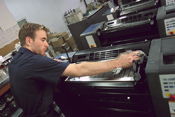
|
|
When to lease versus buy equipment for your small business

Many small business owners struggle with the decision to lease or buy their business equipment. Business equipment can be very expensive. There are pro's and con's to doing either one depending on your circumstances. Find out what is best for your business by taking a look at when to lease versus when to buy equipment for your small business.
Why should you buy? Here are the benefits:
Buying equipment is easy
You find what you want and need and then you just buy it! Leasing will require paperwork and questions like: how and where you are going to use your equipment. When you buy your equipment, you can use it where and how you please.
You can do maintenance your way
When buying, you can run and maintain your equipment in the ways you want to. If you lease the equipment, the leasing company will have you do maintenance on the equipment their way. This can get very expensive with their specifications.
Tax breaks
Your equipment is a tax deductible. When buying equipment, you can deduct the full price of it. When leasing, you can only deduct the monthly payments.
|
|
The downsides to buying equipment for your small business:
Too expensive
The initial cost of your equipment may be too expensive for you to purchase all at once, especially if your small business is just starting out. You may have to buy your equipment on credit, which could have been an option for advertising or marketing your business.
Outdated equipment
When buying, you are stuck with what you have. This leaves little room to buy new updated equipment. It can get very costly buying newer equipment every few years.
Let's take a look at the benefits of leasing your business equipment:
No initial fees
Most small businesses do not have a lot of extra money lying around. When leasing, you don't have up front costs.Leases rarely require a down payment. This way you are able to get equipment without much cost at the beginning. Plus, you can keep up with your pre-determined monthly expenses.
Up-to-date equipment
Leasing allows you to keep your equipment up-to-date. If you have a lease that lasts a small amount of time, after that lease expires you can trade your equipment in for newer, faster equipment. This ensures that you are keeping up with other businesses. You may even have the upper-hand because your technology is more sophisticated and newer.
If you're thinking about leasing equipment, you'll need to do your homework to make sure you get the most out of your lease.Some questions to ask before leasing are:
What kind of lease are you being asked to sign?
When companies decide to lease equipment, they must decide between the finance lease and the operating lease. A finance lease is: when a lessee only needs one piece of equipment and that only requires a single contract.An operating lease is: when companies may need to continually lease other equipment and want to use a single lease for all equipment to avoid getting a new contract with each piece of equipment. The type of lease a business chooses should match theirneeds, goals and cash-flow requirements.
How long is the lease for?
Many leases are 24-48 months. The longer your lease, the lower your monthly payments, but you're probably going to end up paying more over time with a longer lease.
Does the equipment have to be insured?
Some companies require you to insure their equipment. If you decide not to, they may add more expensive monthly fees to cover insurance.
Can you get rid of the lease early?
If you decide you want to get newer equipment and want to pay off your lease early, see if there are any penalty fees. Also check to see if you can even get rid of the lease prematurely.
When to lease versus when to buy equipment for your small business is up to you. Both leasing and buying equipment comes with benefits and downsides. Whether you buy or lease, just remember to see what options will best suit your business at the time of purchase and for the future.
Privacy Policy, Terms of Use